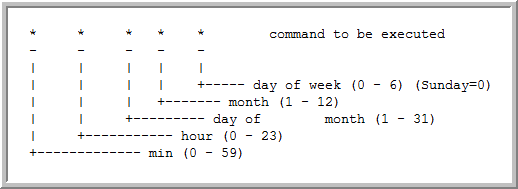Reporting Database Export Backups
This method is the preferred method of ensuring that your database is backed up on a regular basis. This is a two-step process:
Customizing the Export Script
Beginning with Hitachi Storage Viewer 8, Feature Pack Three (8.3.00), a template is provided for automating the database backup process. This template needs to be copied and then customized for your installation.
1. Locate the script template:
Linux: opt/aptare/database/tools/export_database_template.sh
Windows: C:\opt\oracle\database\tools\export_database_template.bat
2. Before customizing the backup script, export_database_template.sh|bat, first copy it and then rename it to something like: export_database.sh|bat
This preserves the template file, which gets overwritten during a Portal upgrade, and provides a file for customization and execution: export_database.sh|bat
3. Refer to the relevant steps to customize the script:
4. Refer to the relevant steps to schedule the task:
Important! It is critical that the database export file is included in your file system backup policy so that, in the event of a disaster, you can restore and then import the export file.
Linux: Customize the Script
In the export_database.sh script:
• Replace customername with your relevant company name.
• Replace /ora_exports with a directory that is included in your file system backup policy.
#!/bin/sh
# The following script is the Hitachi Storage Viewer database export script for customername
NOTIFY_LIST="support@customername.com"
FILENAME=customername_scdb.exp_`date +%m%d%g`
LOGFILENAME=ccustomername_scdb_`date +%m%d%g`.log
ORACLE_HOME=/opt/aptare/oracle
ORACLE_SID=scdb
export ORACLE_HOME ORACLE_SID
# Set the export directory
PATHNAME=/ora_exports
# Export the database
/opt/aptare/oracle/bin/exp parfile=/opt/aptare/database/tools/export_scdb.par file=$PATHNAME/$FILENAME log=$PATHNAME/$LOGFILENAME
if [ $? -eq 0 ]; then
if [ -f $PATHNAME/$FILENAME]; then
if [ -f "$PATHNAME/$FILENAME.gz" ]; then
rm -f "$PATHNAME/$FILENAME.gz"
fi
echo "Done with export"
fi
else
echo `date` "Problem with export on customername"
echo "Problem with export on customername" | mail -s "customername export problem" $NOTIFY_LIST
exit 1
fi
gzip -f "$PATHNAME/$FILENAME"
exit 0
Windows: Customize the Script
In the export_database.bat script:
• Replace customername with your relevant company name.
• Replace C:\tmp with a directory included in your file system backup policy.
• Customize the mailto line to be compatible with your environment.
• If you choose to use a tool other than 7-Zip, change the software used to zip the file.
@echo off
REM The following script is the Hitachi Storage Viewer database export script for customername
SET NOTIFY_LIST=support@customername.com
FOR /F "TOKENS=1* DELIMS= " %%A IN ('DATE/T') DO SET CDATE=%%B
FOR /F "TOKENS=1,2 eol=/ DELIMS=/ " %%A IN ('DATE/T') DO SET mm=%%B
FOR /F "TOKENS=1,2 DELIMS=/ eol=/" %%A IN ('echo %CDATE%') DO SET dd=%%B
FOR /F "TOKENS=2,3 DELIMS=/ " %%A IN ('echo %CDATE%') DO SET yyyy=%%B
SET date=%mm%%dd%%yyyy%
set date=%date: =%
REM Set the export directory
SET PATHNAME=C:\tmp
SET FILENAME=aptare_scdb.exp_%date%
SET LOGFILENAME=customername_scdb_`date +%m%d%g`.log
SET ZIP_FILENAME=%PATHNAME%\%FILENAME%.zip
REM Export the database
c:\opt\oracle\bin\exp parfile=c:\opt\oracle\database\tools\export_scdb.par file=%PATHNAME%\%FILENAME% log=$PATHNAME\$LOGFILENAME
ECHO %ZIP_FILENAME%
IF ERRORLEVEL 0 (
IF exist %PATHNAME%\%FILENAME% (
IF exist %ZIP_FILENAME% (
DEL %ZIP_FILENAME%
echo Done with export
)
)
)
IF NOT ERRORLEVEL 0 (
echo %date% "Problem with export on customername"
START mailto:%NOTIFY_LIST%?subject=20customername%%20export%%20problemˆ&body=Problem%%20with%%20export%%20on%%20customername
)
"c:\Program Files\7-Zip\7z.exe" a %ZIP_FILENAME% %PATHNAME%\%FILENAME%
IF exist %ZIP_FILENAME% (
IF exist %PATHNAME%\%FILENAME% (
DEL %PATHNAME%\%FILENAME%
)
)
Scheduling the Export Job (Linux)
1. Switch to user aptare.
su - aptare
2. Edit or create the crontab file.
crontab -e
3. Using the following diagram, specify the database export schedule.
Example:
04 15 * * * /opt/aptare/utils/export_database.sh 2>&1 >>/tmp/database_export.log
4. Verify the newly scheduled job:
crontab -l
Scheduling the Export Job (Windows)
1. Start > Programs > Accessories > System Tools > Task Scheduler
2. Create a new task in the Task Scheduler by specifying the schedule and the script to be run:
c:\opt\aptare\utils\export_database.bat

